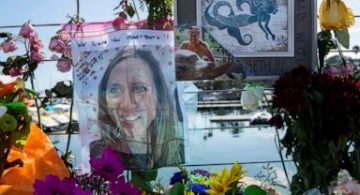In a story July 17, The Associated Press reported that newly relaxed federal requirements are expediting the process for sending child migrants to live with relatives already in the U.S. The story should have specified the changes only apply to adult siblings and grandparents.
An updated version is below:
The nation’s largest facility for migrant children has released hundreds of teens to relatives in recent days, easing overcrowding at the South Florida center that has come under intense criticism from Democratic lawmakers who call it cramped and regimented.
The company that runs the Homestead facility, Caliburn International, said it has released 500 teenagers since Friday under newly relaxed federal requirements for reuniting the children with certain relatives living in the U.S.
That brings the population at the center to about 1,300 — down from 1,800 last week and 2,500 about a month ago, spokeswoman Tetiana Anderson said. She also said making the facility better prepared for foul weather was a factor in reducing the numbers.
The change comes as the government expands a former oilfield worker camp in rural Texas to house as many as 1,300 children.
Last month, the U.S. Department of Health and Human Services expedited the process for sending child migrants to live with relatives already in the U.S. by eliminating a fingerprinting requirement for adult siblings and grandparents. It also stopped universally requiring child abuse and neglect checks unless there are special concerns.
The dramatic population drop at Homestead comes a few weeks after Democratic presidential candidates including Sen. Elizabeth Warren and Sen. Bernie Sanders made campaign stops at the center south of Miami to attack the Trump administration’s immigration record while in town for a Democratic debate.
On Monday, a delegation with members of the House Appropriations subcommittee on Labor, Health and Human Services, and Education toured the facility and said the children were subjected to “inhumane conditions.”
Critics have condemned Homestead and other emergency influx facilities where children are commonly sent after they cross the U.S.-Mexico border and are detained by Border Patrol agents. But the government says it needed those locations to move children away from Border Patrol custody, where overcrowding and filthy conditions also have sparked outrage from lawmakers.
Advocates say that, unlike other smaller shelters across the country, Homestead is not state licensed.
They also have filed inquiries to the Trump administration related to the awarding of a no-bid contract to a company tied to former White House Chief of Staff John Kelly. Government spending records shows the government reduced the ceiling value of the award from $341 million to $273 million in May.
An Amnesty International researcher who toured the facility as it was reducing its population said officials told her the goal was to bring capacity down to about 1,200, in part to have a safe amount for evacuations in the event of a hurricane.
The researcher, Denise Bell, said the expedited process for placing the children was welcome. She said the recent release has been “extraordinary” but the fact that it wasn’t done sooner shows the Trump administration was engaged in a “deliberate policy to punish children.”
Immigrant advocates and lawmakers have demanded that the Homestead facility be shut down altogether.
The U.S. Department of Health and Human Services has said it is “premature to speculate” whether the facility may shut down.





